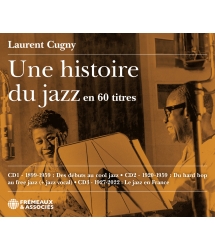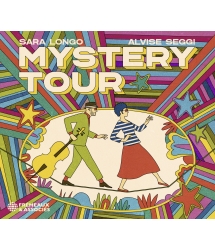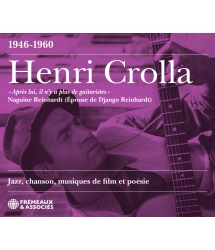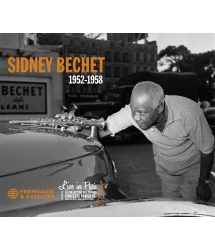- Our Catalog
- Philosophy
- Philosophers of the 20th century and today
- History of Philosophy (PUF)
- Counter-History and Brief Encyclopedia by Michel Onfray
- The philosophical work explained by Luc Ferry
- Ancient thought
- Thinkers of yesterday as seen by the philosophers of today
- Historical philosophical texts interpreted by great actors
- History
- Books (in French)
- Social science
- Historical words
- Audiobooks & Literature
- Our Catalog
- Jazz
- Blues
- Rock - Country - Cajun
- French song
- World music
- Africa
- France
- Québec / Canada
- Hawaï
- West Indies
- Caribbean
- Cuba & Afro-cubain
- Mexico
- South America
- Tango
- Brazil
- Tzigane / Gypsy
- Fado / Portugal
- Flamenco / Spain
- Yiddish / Israel
- China
- Tibet / Nepal
- Asia
- Indian Ocean / Madagascar
- Japan
- Indonesia
- Oceania
- India
- Bangladesh
- USSR / Communist songs
- World music / Miscellaneous
- Classical music
- Composers - Movie Soundtracks
- Sounds of nature
- Our Catalog
- Youth
- Philosophy
- News
- How to order ?
- Receive the catalog
- Manifesto
- Dictionnary











- Our Catalog
- Philosophy
- Philosophers of the 20th century and today
- History of Philosophy (PUF)
- Counter-History and Brief Encyclopedia by Michel Onfray
- The philosophical work explained by Luc Ferry
- Ancient thought
- Thinkers of yesterday as seen by the philosophers of today
- Historical philosophical texts interpreted by great actors
- History
- Books (in French)
- Social science
- Historical words
- Audiobooks & Literature
- Our Catalog
- Jazz
- Blues
- Rock - Country - Cajun
- French song
- World music
- Africa
- France
- Québec / Canada
- Hawaï
- West Indies
- Caribbean
- Cuba & Afro-cubain
- Mexico
- South America
- Tango
- Brazil
- Tzigane / Gypsy
- Fado / Portugal
- Flamenco / Spain
- Yiddish / Israel
- China
- Tibet / Nepal
- Asia
- Indian Ocean / Madagascar
- Japan
- Indonesia
- Oceania
- India
- Bangladesh
- USSR / Communist songs
- World music / Miscellaneous
- Classical music
- Composers - Movie Soundtracks
- Sounds of nature
- Our Catalog
- Youth
- Philosophy
- News
- How to order ?
- Receive the catalog
- Manifesto
- Dictionnary
LIVE IN LE QUECUMBAR LONDON
ANGELO DEBARRE
Ref.: FA513
Artistic Direction : DAVE KELBIE
Label : Frémeaux & Associés
Total duration of the pack : 58 minutes
Nbre. CD : 1
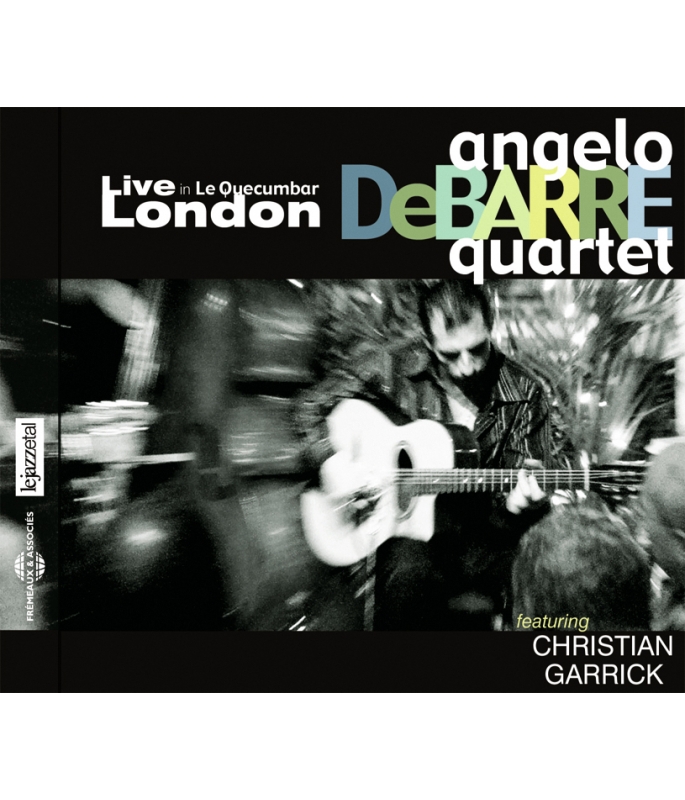
LIVE IN LE QUECUMBAR LONDON
LIVE IN LE QUECUMBAR LONDON
“The foremost Gypsy guitarist in the world and a legend amongst European Gypsies, Debarre has astonished British audiences with his virtuosity for the last six years. He’s one of the most versatile guitarists of our time and is the recognized master of the style originated by Django Reinhardt and Stephane Grappelli at the Hot Club de France. Formed in 2000 the Angelo Debarre Quartet has been stunning audiences Europe wide with their cutting edge approach to the later period of the Reinhardt repertoire.” Benjamin Goldenstein & Patrick Frémeaux
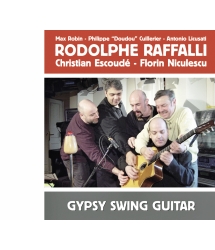
RODOLPHE RAFFALLI TRIO FEATURING FLORIN NICULESCU &...
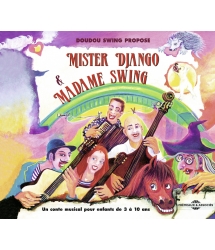
PAR LE GROUPE DOUDOU SWING
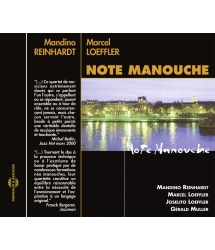
MANDINO REINHARDT & MARCEL LOEFFLER
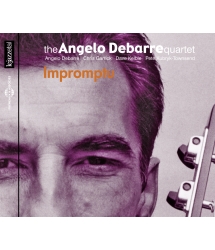




-
PisteTitleMain artistAutorDurationRegistered in
-
1Fantaisie sur une danse norvégienneDebarre Quartet Angelo00:04:432007
-
2Django's TigerDebarre Quartet Angelo00:02:562007
-
3Limehouse BluesDebarre Quartet Angelo00:04:412007
-
4Artillerie lourdeDebarre Quartet Angelo00:05:162007
-
5VampDebarre Quartet Angelo00:05:262007
-
6Place de BrouckèreDebarre Quartet Angelo00:04:492007
-
7SpeevyDebarre Quartet Angelo00:04:112007
-
8Lentement MademoiselleDebarre Quartet Angelo00:06:132007
-
9ImpromptuDebarre Quartet Angelo00:03:332007
-
10BoléroDebarre Quartet Angelo00:04:092007
-
11Porto CabelloDebarre Quartet Angelo00:04:482007
-
12FéérieDebarre Quartet Angelo00:03:482007
-
13My SérénadeDebarre Quartet Angelo00:04:162007
Angelo Debarre Quartet
Angelo Debarre Quartet
Live in Le Quecumbar London
Lejazzetal
Lejazzetal s’est forgé une réputation internationale dans la promotion musicale et culturelle ainsi que dans l’organisation de tournées et de concerts. Depuis son siège londonien, Lejazzetal a produit des concerts dans le monde entier et a pour objet le développement scénique de projets musicaux ouverts et exigeants gravitant autour des cultures tziganes et manouches. A son actif, plus de vingt années d’expérience dans les tournées au Royaume-Uni d’artistes venus du monde entier. Des plus grandes salles aux petits clubs, du soliste aux grandes formations, de la star internationale à l’artiste en développement, nos tournées sont autant de collaborations artistiques et d’ouvertures sur la diversité culturelle.
Pour plus d’informations sur son site Internet
The Lejazzetal producing company has developed and maintained an international reputation for promoting and presenting music and culture at the highest level on stage, on tour. The company boasts over 20 years experience working with international musicians from around the world in partnership with venues in the UK. Thus creating a production platform of exciting, diverse and culturally relevant artistic collaborations. Touring projects range from solo artists to large bands, from large concert halls to small clubs. Having established it’s presence in the UK, Lejazzetal, it now produces concerts worldwide and has proved it’s commitment to live audience development time and again through a programme of music that includes the highest possible standard of artistic content. Lejazzetal Records has released 10 albums including critically acclaimed albums by Evan Christopher’s Django a la Creole, Fapy Lafertin, Angelo Debarre, Szapora, The George Washingmachine Quartet, and Tcha Limberger’s Budapest Gypsy Orchestra.
Dave KELBIE
© 2009 LEJAZZETAL – FRÉMEAUX & ASSOCIÉS
Discographie
1. Fantaisie (sur une danse norvégienne) (E.H. Grieg / D. Reinhardt) 4’43
2. Django’s Tiger (Django Reinhardt) 2’57
3. Limehouse Blues (P. Braham / B. Furber) 4’41
4. Artillerie Lourde (Django Reinhardt) 5’17
5. Vamp (Django Reinhardt) 5’27
6. Place de Brouckère (Django Reinhardt) 4’49
7. Speevy (D. Reinhardt / Stéphane Grappelli) 4’12
8. Lentement Mademoiselle (Django Reinhardt) 6’13
9. Impromptu (Django Reinhardt) 3’34
10. Boléro (Django Reinhardt) 4’10
11. Porto Cabello (Django Reinhardt) 4’48
12. Féérie (Django Reinhardt) 3’49
13. My Sérénade (Django Reinhardt) 4’17
Angelo Debarre : Guitare
Christian Garrick : Violon
Dave Kelbie : Guitare
Andy Crowdy : Contrebasse
Produit par Lejazzetal, London
Enregistré “Live” à Le Quecumbar, Londres (www.quecumbar.co.uk ; www.leqrecords.com) les 6 et 7 juin 2007.
Ingénieur du son : Dylan Fowler, du Stiwdio Felin Fach, Abergavenny (U.K.)
Mixage et mastering : Dave Kelbie & Dylan Fowler
Special thanks to Mirella Hodzic, Dylan Fowler, the band & Wac
Artwork : Dave Kelbie / Photos (prises dans Le Quecumbar) : Peter Clark
Merci au Quecumbar d’avoir accueilli le concert et sa captation. A Sylvia Rushbrooke d’avoir créé cette salle, qui est sans doute le meilleur lieu de concerts acoustiques au Royaume-Uni. A Monika, Jimmy et Julien d’avoir contenu les fans, et à Monika pour son verre brisé sur “My Serenade”.
Thanks to Le Quecumbar for the use of the venue. To Sylvia Rushbrooke for creating arguably the best acoustic venue in the UK. To Monika, Jimmy & Julien for keeping the fans in order, and Monika for the glass smash on ’My Serenade’
Management, booking: Lejazzetal London, U.K. (+44 7967 728259)
Conjuguant virtuosité, précision du phrasé et sentiment, Angelo est impérial, comme toujours (cf. son long chorus sur “Vamp”) et les anglais ne font pas de la figuration : rythmique très efficace, violoniste inspiré. Django est à l’honneur : “Artillerie lourde”, “Place de Brouckère”, “Lentement Mademoiselle”, “Porto cabello”, “Troublant boléro”... qu’Angelo porte à un haut niveau d’interprétation sans copier le maître.
Francis Couvreux, Etudes Tziganes
Angelo Debarre
Angelo Debarre est sans conteste l’un des principaux guitaristes manouches actuels, de par sa discographie, la fréquence de ses tournées internationales, le charisme émanant de ce joueur extrêmement véloce et lyrique au calme olympien et à l’élégance rare. Né en 1962 à Saint-Denis, dans la communauté manouche, Angelo apprend précocement la guitare (après s’être initié à la batterie). Il écume les rues et les bars de Paris, et au début des années 1980, perfectionne sa connaissance du répertoire Tzigane aux côtés de Serge Camps dans son cabaret “La Roue Fleurie”, où il enregistrera (1989) son premier disque Gypsy Guitars, devenu mythique, pour le label Hot Club Records. Angelo impressionne par l’aisance avec laquelle il s’exprime sur les standards de jazz joués aux tempi les plus enlevés, comme sur les valses manouches ou les airs folkloriques tziganes. Dans les années qui suivent, ses apparitions discographiques sont assez rares (citons, en tête d’affiche, ses duos avec Moreno Winterstein ; en invité, des morceaux d’anthologie avec le groupe Bratsch), mais sa légende se développe chez les amoureux – alors peu nombreux – du jazz manouche hérité de la musique de Django Reinhardt. En 1998, Angelo Debarre enregistre comme leader l’album Mosaïque (auquel participent Florin Niculescu et, plus étonnamment, Bojan Z au piano). Les années suivantes verront sa discographie et sa popularité exploser, avec de nombreux albums pour le label “Le Chant du Monde” : des duos avec l’exceptionnel accordéoniste Ludovic Beier et, plus récemment, son trio tout à cordes. Angelo Debarre est devenu, comme Biréli Lagrène, Stochelo Rosenberg ou Tchavolo Schmitt, une incarnation même du guitariste manouche, dont il a poussé l’art au plus haut niveau.
Chris Garrick
A 38 ans seulement, Chris Garrick fait partie des meilleurs improvisateurs de violon jazz au monde. S’il est parfaitement capable de jouer dans la tradition établie par Stéphane Grappelli, Chris s’est également forgé un style bien personnel, issu de la multiplicité de ses influences et intérêts artistiques. C’est ainsi qu’il est reconnu : un artiste créatif et audacieux, capable d’embrasser tous les jazz, de Stéphane Grappelli à John McLaughlin. Technique, audace et besoin de créativité, sont solidement ancrés en Chris Garrick, et jalonnent son histoire : de la transmission de son père, le pianiste et compositeur Christian Garrick à la prestigieuse Royal Academy of Music de Londres, cet enfant des années 1970 a par ailleurs grandi dans le dogme du no-limits ! On a ainsi pu l’entendre dans une composition de Piazzola (Las Cuatros Estaciones Porteñas) comme dans le Jazz Violin Concerto écrit pour lui par Sir John Dankworth, mais aussi électrifié dans des ensembles expérimentaux, ou pur swing acoustique avec des musiciens manouches. En 1992, Chris Garrick forme le quartet qui porte son nom avec lequel il enregistre 6 disques, dont Different Strokes qui sera classé dans le “Top Ten” du journal The Times. Il dirige également d’autres formations et est un musicien de studio très demandé, notamment par certains des meilleurs compositeurs de musiques de films (Danny Elfman, George Fenton, Rachel Portman, Rob Lane ou David Arnold) pour lesquels il a travaillé sur les B.O de Chicago, Le Chocolat, Brideshead Revisited (à paraître en France), The Edge of Love ou de Borat.
Dave Kelbie
Avant son succès médiatique en tant que producteur (et instrumentiste) du “Django à la Créole” d’Evan Christopher, c’est aux côtés d’une icone hollandaise du monde manouche que Dave Kelbie a forgé sa réputation : accompagnateur et arrangeur de Fapy Lafertin, Dave et son quartet Lejazz tournent en Europe de 1989 à 2003. Entre temps, Dave a fait paraître sur son label deux disques de Fapy, dont le célèbre “Hungaria”. Son projet le plus célèbre est sans doute Szapora, ensemble poly-ethnique et avant-gardiste de neuf musiciens dédié aux musiques balkaniques qui a déjà trois disques à son actif et une renommée internationale. Depuis sa collaboration avec Fapy Lafertin, Dave a côtoyé sur scène des artistes tels que le violoniste Hongrois Roby Lakatos, le clarinettiste Bob Wilber, les guitaristes Angelo Debarre, Bireli Lagrene, Lollo Meier ou John Etheridge. Musicien, producteur, tourneur, Dave Kelbie est reconnu comme l’un des grands promoteurs de la culture manouche au Royaume-Uni - et au-delà. Il est un des membres (et le manager) du Django à la Créole d’Evan Christopher.
Andy Crowdy
Bassiste réputé de la scène jazz anglaise, Andy Crowdy jouit aujourd’hui d’une réputation internationale forgée dans les nombreux concerts auxquels il a participé en Europe et aux Etats-Unis. Andy a été très en vue, aux cours des dernières années, sur la scène du jazz manouche : aux côtés d’Angelo Debarre, de Lollo Meier et de Sweet Chorus (avec John Etheridge et Chris Garrick). Andy Crowdy a également beaucoup tourné – à la basse, mais aussi à la guitare – avec Lillian Boutté, en Europe, aux Etats-Unis et en Australie. Musicien éclectique, attiér par le jazz, mais encore le rock, le blues et le folk, Andy est également compositeur et développe ses créations dans le groupe Temporial Twins, avec Steve Waterman. Outre ses capacités d’instrumentiste (il apparaît sur plus de 50 disques à ce jour) et de compositeur, Andy est également réputé outre-manche pour ses participations à des productions audiovisuelles (cinéma, télévision et radio).
© 2009 LEJAZZETAL – FRÉMEAUX & ASSOCIÉS
english notes
“The ensemble passages delight, both Debarre and Garrick scrabbling around like two mice racing each other. Every new solo seems to set itself new challenges; diving-bombing fiddle-runs and rattling guitar tumbles dare each other to try something a little faster and more fiddly next time. The speed and execution are expert, but it still sounds thrillingly like anyone could trip over themselves and flat on their face at any time. Not, of course, that they ever do.”
Matthew Milton, !!!! Songlines
Angelo Debarre
Angelo is undoubtedly one of the major Gypsy swing guitarists of our time, owing to the many CDs he recorded, the high number of his international tours and the charisma of this extremely fast and lyrical player. Angelo was born in a Gypsy family near Paris, year 1962. Although his first instrument was the drums, Angelo started to play the guitar when he was only 8. Of course, his idol was Django Reinhardt. In the early 80’s one could hear his impressive technique in many Parisian places, especially Serge Camps’ Russian cabaret “La Roue Fleurie” where Angelo was taught the complete Eastern-Europe Tzigane repertoire. He recorded there, with Serge Camps, his first record, issued in 1989 by the Hot Club Records label: Gypsy Guitars, which became soon quite legendary thanks to Angelo’s capacity to swing on the fastest tempos, the lyricism of its ballads, the technique of the Tzigane tunes, the brio of the manouche waltzes he plays. Angelo was then rarely seen, but in the Parisian cafés. Except for a few appearances (two CDs with Moreno Winterstein, invited by Bratsch), his first real album as a leader was released in 1998: Mosaïque, featuring Florin Niculescu and jazz pianist Bojan Z. In the following years, Angelo Debarre, thanks to the many CDs he recorded for French label “Le Chant du Monde” (especially with accordion virtuoso Ludovic Beier) became an international star. He has now toured all around the world and become a living incarnation – as Bireli Lagrène, Stochelo Rosenberg, or Tchavolo Schmitt – of today’s Gypsy swing.
Chris Garrick
38-year old British musician and composer Chris Garrick is among the world’s leading jazz and improvising violinists. Whilst still able to play in the tradition established by Stephane Grappelli, Chris has forged his own style, which reflects his contemporary interests. He has been described as a wild and creative musician who strides across the genres of jazz from Grappelli to McLaughlin. Graduate of the Royal Academy of Music, he studied under the inspirational violinist Johnny Van Derrick and received piano and composition tuition at home from his father, the pianist and composer Michael Garrick. A 70’s kid, brought up to see no limits, Chris embraces a broad base of activities ranging from conventional orchestral settings with Piazzolla’s Las Cuatro Estaciones Portenas or the Jazz Violin Concerto by Sir John Dankworth (a piece written especially for Chris), through cutting edge music using FX and looping on the electric violin, to traditional swing and Gypsy fiddling. He formed his award-winning quartet in 1992 for which he has written a substantial amount of original work, and has recorded six solo albums including Different Strokes, which was a top ten hit in The Times. As a specialist in non-classical solo violin, Chris is an active session musician in London and has worked for composers such as Danny Elfman, George Fenton, Rachel Portman, Rob Lane and David Arnold, and on films including Chicago, Chocolate, Brideshead Revisited, The Edge of Love and Borat.
Dave Kelbie
As a musician and arranger Dave Kelbie first gained recognition for his work with the celebrated Dutch Gypsy guitarist Fapy Lafertin and the debut European tour in 1989 with the UK based quartet Lejazz. This partnership has lasted until 2003 with 2 releases on his own label Lejazzetal including the highly acclaimed Hungaria. The groundbreaking UK-based Szapora is perhaps his best known project. A nine-piece multi-national Balkan music cooperative featuring Bosnian singing superstars Mirella and Tea Hodzic alongside well known British musicians Christian Garrick and Dylan Fowler with a legacy of three CDs and a worldwide reputation. Following his alliance with Lafertin have come performances with musicians such as Hungarian violinist Roby Lakatos, Clarinettist Bob Wilber, Angelo Debarre, Bireli Lagrene, Lollo Meier, John Etheridge and Belgiums’ Brassens specialist Koen De Cauter. His association with many of these Gypsy musicians has led him to highly regarded internationally as a promoter of Gypsy music and culture in the UK and beyond. He has engineered music partnerships with many of Europes leading Gypsy musicians including the first European tour of Roma band Kal, Naat Veliov’s Original Kocani Orkstar from Macedonia, and the recent debut tour of Tcha Limberger’s Budapest Gypsy Orchestra. Dave is a member (and the manager) of Evan Christopher famed project : Django à la Créole.
Andy Crowdy
Well-known and highly rated bass player on the UK jazz scene, Andy has played with many leading performers from the UK, Europe and America, and is in constant demand. Over the last years Andy has been working extensively on the Gypsy Jazz scene with Angelo Debarre, Lollo Meier and Sweet Chorus (featuring John Etheridge and Chris Garrick), and New Orleans-born singer Lillian Boutte, with whom he has played bass and guitar at festivals and workshops in Europe, America and Australia. He is also playing with a new Anglo-German band with Steve Waterman, called Temporal Twins, which features many of Andy’s compositions. Andy has a love of many musical styles beyond jazz, leading him also to play rock, blues and folk music. This has given him a huge breadth of musical experience, which he has shared in workshops all over the world, teaching groups and individuals with equal enthusiasm. Andy also has extensive experience in the recording studio (on more than 50 cds to date) and is no stranger to our screens, having performed in major motion pictures (“White Hunter, Black Heart”, starring Clint Eastwood), TV drama productions (“Doggin’ Around”, starring Elliot Gould and Geraldine James), chat shows (“The Late Show”, “The Big Breakfast”, “Blue Peter”, etc.) and radio productions (Gogol’s “Dead Souls”, featuring Andy playing balalaika as well as double bass!).
© 2009 LEJAZZETAL – FRÉMEAUX & ASSOCIÉS
ADDITIVE REVIEW
TheJazzmann.com
Angelo DeBarre is a brilliant gypsy guitarist who plays in the style of Django Reinhardt. Hailing from just outside Paris the Frenchman has joined forces with three excellent British musicians to form this exceptional quartet. Violinist Christian Garrick is cast in the Stephane Grappelli role with Andy Crowdy on double bass and Dave Kelbie on rhythm guitar completing the line up.
I saw this line up give an enthralling performance to a packed house at the intimate Wyeside Art Centre in Builth Wells recently. Many of the tunes featured there appear on this excellent live album recorded at London’s prestigious Le Quecumbar venue.
The quartet specialise in covering some of Reinhardt’s less famous pieces, many of them coming from the later stages of his career. The arrangements are all by the quartet themselves and their imaginative interpretations help to keep the spirit of Django alive whilst at the same time appealing to contemporary audiences. It was good to see such a wide range of ages enjoying the music at Builth-from children to pensioners.
At Builth as on the album the quartet opened up gently with the delicate strains of “Fantasie” . Only with the following “Django’s Tiger” are the furious rhythms of the archetypal “Hot Club” sound unleashed, their effect heightened by the contrast with the relaxed nature of the opener.
“Limehouse Blues” keeps the energy levels up on the album with Garrick sawing and soaring and DeBarre also taking flight. He is a dazzling guitarist with his lightning fast runs, breakneck rhythms and astonishing string bending.
The quartet’s imaginative arrangement of “Artillerie Lourde” contains a strong blues element and throws in a quote from “Tuxedo Junction”. It’s also the vehicle for more DeBarre pyrotechnics plus a spot in the limelight from bassist Andy Crowdy who proves to be an inventive and sometimes humorous soloist as well as a fine rhythm player.
It’s not all hundred mile an hour stuff. The lovely “Vamp” is another example of the quartet’s ability to play effectively at slower tempos. The quiet intensity of DeBarre and Garrick’s playing reveals considerable emotional depth.
“Place De Brouckere” restores the momentum with solos from Garrick, Crowdy and DeBarre. Garrick is a remarkable violinist seemingly at home in any genre of jazz from Grappelli to Jean Luc Ponty. In the DeBarre Quartet he sticks to acoustic violin but he is more than happy to unleash the electric model in his own bands. Even here he throws in some modern pizzicato flourishes adding yet another dimension to this uniquely string driven format. Such is his versatility that he’s due to go out on tour with Van Morrison next year. The following “Speevy” offers yet another example of his talents.
“Lentemente Mademoiselle” slows things down again with DeBarre and Garrick intertwining over Kelbie’s gentle rhythmic impetus. As rhythm or “second” guitarist Kelbie is often overlooked. He never solos, leaving this to the sharply dressed DeBarre. Nevertheless he is the backbone of the band, his chording providing the springboard for DeBarre and Garrick’s flights of fancy. Kelbie maintains the pulse flawlessly at any speed from zero to a hundred and twenty, as demonstrated by the following “Impromptu”. But he is the backbone in other ways too, handling the announcements at concerts and manning the merchandise desk. Then there is his role as label boss and administrator of the Lejazzetal organisation. He fills the rhythm guitar role in several other bands too, among them Evan Christopher’s Django A La Creole, the oddly named George Washingmachine Quartet and the Fapy Lafertin Quartet. His love of Django Reinhardt and his music has taken him all over the world spreading the jazz gospel “Hot Club” style.
“Bolero”, “Portocabello” and “Feerie” continue to stoke the fires, the enthusiastic Quecumbar crowd spurring the musicians on. There is more bravura playing from the band as a whole with DeBarre and Garrick in particularly dazzling form. The relaxed tones of the closing “My Serenade” close the album and bookend it in pleasingly symmetrical fashion.
As in London so it was in Builth with the audience responding warmly to a well paced programme full of virtuoso musicianship. The “Hot Club” style has maintained a remarkably high level of popularity over the years, thanks in no small part to the efforts of people like Kelbie. As a result there are a lot of musicians playing in this style but few can do it with the skill and élan of the Angelo DeBarre Quartet. These guys are the real deal.
by IAN MANN - THEJAZZMAN.COM
Bulletin du HCF (English)
Recorded live in a London club in June 2007 this cd shows that the ADQ is one of the best current groups for manouche music. Apart from Angelo the formation comprises an excellent violinist, CG, and two solid accompanists, DK & AC. The problem that you find with manouche style guitarists - that they play too quick and play alot of notes instead of articulating the discourse and allowing it to breath - is only found very little with AD, both in his playing and in the tempos he uses. Speevy, in an ideal medium tempo, is the highlight of the disc but swing is at its best in a good of number of other pieces too: Limehouse Blues. Artillerie lourde, Impromptu and Féerie. On violin CG reveals himself to be a direct disciple of SG. He soars with vigour, while his superb sound allows him to really show off the ballads to their absolute best advantage, in particular My Serenade, Vamp and the celebrated Lentement Mademoiselle, played with lots of retraint, and also the more melocholic Fantasie & Bolero. Only one piece, Django's Tiger, seems inferior in this excellent collection.
par F.A. - BULLETIN DU H.C.F.
Hotclub News, GERMANY
The English Guitarist Dave Kelbie is offering a service to mainly French stars, providing them with a platform to play in England, providing them with a band as well as producing and distributing the CDs. He is also working on behalf of Angelo Debarre. This CD, which was recorded live at the Quecumbar, London, has Kelbie himself on Rhythm guitar, Andy Crowdy on bass and Christian Garrick on violin. Debarre very obviously sounds comfortable in the company of his English accompanists. The repertoire also shows how flexible and securely the musicians work together. Apart from Django's Tiger and Limehouse blues, there are many little played gems of gypsy swing such as Vamp, Place de Brouckere, Speevy, Portocabello, Feerie etc. This CD is recommended with no reservations
by BERHARD GIERSTL - Hotculb News (Germany)
* * * * Songlines
The Spirit of Django - at large in Battersea
There’s a strange mix of the rather naff and the adventurously discordant in Gypsy jazz – something that Django Reinhardt almost seemed to acknowledge in his wry smile in photographs (one of which peeks out avuncularly over the musicians’ backs on the CD’s sleeve). And it’s there in spades on ‘Bolero’, one of this album’s many irresistible moments: it’s cape-twirling pomp, but doesn’t take itself seriously; it’s dissonant but whistleable. So it’s unfair that Gypsy jazz is rarely heard outside car adverts or wine bars. Especially in the case of the formidable guitarist Angelo Debarre and his swashbuckling quartet. You can’t help but share the crowd’s audible gasps of amazement and delight at the his lightening-fast fretboard flights of derring-do. His sideman, Christian Garrick, is no less impressive, slipping in the occasional bluegrassy slide or two on ‘Django’s Tiger’ and sawing thickly away on ‘Speevy’, a tune that manages to sound jaunty yet slightly queezy at the same time. Dave Kelbie and Andy Crowdy take a gentlemanly, self-effacing back seat, providing an unintrusive backing and the occasional solo that concisely says all it need to say. The ensemble passages delight, both Debarre and Garrick scrabbling around like two mice racing each other. Every new solo seems to set itself new challenges; diving-bombing fiddle-runs and rattling guitar tumbles dare each other to try something a little faster and more fiddly next time. The speed and execution are expert, but it still sounds thrillingly like anyone could trip over themselves and flat on their face at any time. Not, of course, that they ever do.
by MATTHEW MILTON - SONGLINES
Independent on Sunday
No other genre makes you laugh out loud with joy and delight like Gypsy jazz, whose guitarists' and fiddlers' unfeasibly flying fingers provoke astonished reactions of disbelief again and again, even though one soon takes impossible virtuosity as the norm. Guitarist DeBarre is regarded by many as the best of his ilk, and this Hot Club de France-styled band, with star violinist Christian Garrick playing Grappelli to DeBarre's Django, provides the perfect holding form for the soloists' show-off runs and spurts. Recorded at the titular London club last summer, this recording is authentically live and dangerous.
by PHIL JOHNSON - THE INDEPENDENT ON SUNDAY
Etudes Tsiganes
Recorded live at Le Quecumbar in London on the 6th and 7th of June 2007. On this CD Angelo reintroduces us to his regular English band; Dave Kelbie on the rhythm guitar, Chris Garrick on violin and Andy Crowdy on bass. As they are not a full time group there is no original music and hardly any rehearsing so these wonderful musicians find each other through standards. Of the 13 titles we find three already recorded in a studio by this same band in 2002. Combining virtuosity, phrasal precision and feeling, Angelo is, as always, imperial (his long solo on Vamp) and the English are not just extras: a very efficient rhythm section with an inspired violinist. It’s all about Django; Artillerie lourde, Place de Brouckère, Lentement mademoiselle, Porto cabello, Boléro... and Angelo takes it to such a high level of interpretation without copying the master. In brief, the French guitarist feels comfortable in musical configuration, and this one isn't the less interesting of all.
by FRANCIS COUVREUX - ETUDES TZIGANES (France)
Djangostation
Oh, oh... Hyperactif, cet Angelo ! A peine sorti des feux de la rampe médiatique pour la sortie de son récent Parole de Swing, voilà que notre guitar-héros national replonge sous les sunlights de la renommée, britanniques cette fois, avec ce pétillant Live enregistré cet été en Albion.
Un nouveau disque, qui au delà de la qualité exceptionnelle du jeu d’Angelo est au moins indispensable pour deux autres bonnes raisons. D’abord c’est un disque live, enregistré au fameux Quecumbar londonien, haut lieu du jazz manouche outre-manche devenu en un temps record la scène incontournable de nos taquineurs de jambon nationaux partis conter fleurette aux anglaises. Et donc une chance pour tous (et pas seulement pour ces veinards de parisiens) de pouvoir apprécier la virtuosité exceptionnelle d’Angelo en concert ; d’autant que l’ambiance du club y est particulièrement déchainée, on les entend même casser des verres (de plaisir, on n’en doute pas...). Et un album indispensable aussi pour le répertoire abordé ce soir là : jetez-y un oeil, (voire une oreille pour les plus audacieux), il n’est pas banal : hormis un Limehouse blues joyeusement déjanté, on n’y trouvera que des compositions de Django. Mais pas de celles qu’on entend le plus souvent : Vamp, Speevy, Impromptu, Féerie, Porto Cabello, Bolero (non, pas le Bolero troublant, le Bolero tout court...), My serenade... Tous ces magnifiques morceaux du génial manouche sont aujourd’hui largement sous-joués. Parfois même sous joués par Django lui même qui ne les enregistra pour certains qu’une seule fois... Et pourtant, quelles merveilles que ces titres aux harmonies souvent très modernes (certains datent de la dernière époque, la plus passionnante pour nombre de djangophiles...). Angelo leur rend là un très bel hommage en se les accaparant et en les rejouant à sa propre manière, virtuose et inspirée. A ses côtés, le violoniste Chris Garrick, un des plus fins archets du Royaume déjà entendu chez Angelo ou chez Gary Potter, montre qu’il a du répondant et constitue un parfait alter ego au jeu du guitariste. Enfin, n’oublions pas la pompe enlevée de Dave Kelbie (quels tempis... !) et la contrebasse d’Andy Crowdy, qui a eux deux constituent la crème (anglaise) de la rythmique britannique.
Bref, un disque qui donne envie de passer le Channel pour y voir de plus près, et casser nous aussi quelques verres au Quecumbar !
God save the swing !
par SEBASTIEN LEGE - DJANGOSTATION (France)
The Guardian, UK
Biréli Lagrène's concert was cancelled because of ill health. Fortunately Angelo Debarre, another virtuoso Gypsy jazz guitarist, was free. And the musicians booked with Lagrène were the regular members of Debarre's quartet, so this was a polished show by a band with an easy improvisational rapport and sharp arrangements. What's more, they really swing, using the musical blueprint sketched out 70 years ago by the Quintette du Hot Club de France, led by Django Reinhardt and Stéphane Grappelli. Who could have guessed that this fleet, drummerless genre would prove to be so robust?
Dave Kelbie's rhythm guitar is the motor tonight, providing a strict, subtle pulse - whatever the tempo. Pete Kubryk-Townsend's bass parts are rarely flashy, but take advantage of the freedom provided by Kelbie's solid four, with occasional vocalised arco playing. Christian Garrick has settled on a violin style compatible with the idiom without pastiching the sweet tones of Grappelli.
Debarre is something else: a lean, dark, seated figure, cradling his guitar - motionless apart from his hands and fingers, which fly around the instrument at speed. Such virtuosity is not a decoration, but essential to Debarre's artistry, turning sentimental swingers such as I'll See You in My Dreams into bittersweet sonatas.
The set list draws heavily on the early jazz repertoire: Limehouse Blues, Ol' Man River and fine Reinhardt compositions such as Tears and Place de Brouckere. The three-part Porta Cabello demonstrates Debarre's assured playing at a slow tempo before charging into hot solos for guitar and violin. A version of the Sheik of Araby prompts a quirky, clipped outing from Debarre, while Impromptu provides the starting point for another dazzling display.
by JOHN WALTERS - THE GUARDIAN, UK
04.08.2004 - Angelo Debarre at the Hull Jazz Festival
Within 30 seconds of the opening Honeysuckle Rose, it didn’t matter the ‘infant Django’ Bireli Lagrene had cancelled at the last minute due to ill health. The night belonged to Angelo Debarre and the crowd willingly gave it to him.
It was one of those gigs that leaves you with a big dappy grin and bubbling with the kind of excited, hyperactive “that was brilliant” feeling you haven’t experienced since you were about eight. I’m still smiling now, and will be for days.
The entire concert oozed class and swung with a Continental feel, wearing on its sleeve the French origins of gypsy jazz, a style made popular by guitar legend Django Reinhardt and violin pioneer Stephane Grappelli.
The quartet featured Dave Kelbie on rhythm guitar, who held the whole night together with some great chord work, and Pete Kubrick Townsend, who displayed great taste and sympathy for the genre. His bowed solo was real highlight.
Violin player Christian Garrick played with immense passion, took some amazing solos and supported Angelo diligently.
But the night belonged to the visiting French gypsy, who’s been playing since the age of eight.
All the fire and passion he put in to his playing scooped up the audience and carried them with him. There were some truly breathtaking solos, and not just at breakneck tempos, the ballads were melodic and heartfelt.
His accompaniment for Christian’s solos were a masterclass in chord substitutions and he really injected energy and movement into pieces.
In a genre of jazz so dominated by Django, Debarre manages to put his own stamp on the music. And there are not many you can say that about.
CD Angelo Debarre Quartet © Frémeaux & Associés (frémeaux, frémaux, frémau, frémaud, frémault, frémo, frémont, fermeaux, fremeaux, fremaux, fremau, fremaud, fremault, fremo, fremont, CD audio, 78 tours, disques anciens, CD à acheter, écouter des vieux enregistrements, albums, rééditions, anthologies ou intégrales sont disponibles sous forme de CD et par téléchargement.)
